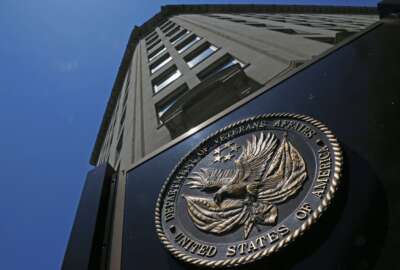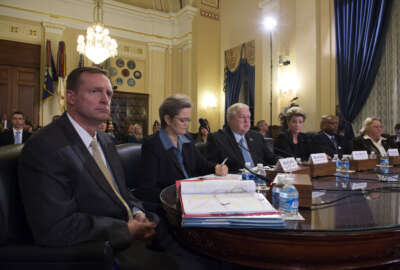
DoJ says key VA Choice provision for SES appeals is unconstitutional
The Justice Department says a specific provision in the Veterans Choice Act, which ultimately renders that the disciplinary decision from administration MSPB judge...
The Justice Department said a controversial provision in the Veterans Access, Choice and Accountability Act — which ultimately renders an administrative judge’s decision final in a senior executive’s disciplinary appeal before the Merit Systems Protection Board — is unconstitutional.
Justice responded to an appeal from Sharon Helman, a VA senior executive who claimed that the final decision from an MSPB judge sustaining her removal from the department ultimately violated the Appointments Clause in the Constitution.
U.S. Attorney General Loretta Lynch agreed.
In a May 31 letter to Senate Legal Counsel, she said DoJ won’t defend against Helman’s challenge to a specific provision in the VA Choice Act. The notion that a federal employee — a MSPB administrative judge in this case — holds the final opinion on a senior executive’s future and could overrule a decision from a presidentially-appointed secretary, makes little sense, Lynch said.
“Section 707 thus vests a federal employee with the final authority — unnreviewable by any politically accountable officer of the Executive Branch — to determine whether to uphold the removal of a [Department of Veterans Affairs], which includes the power to overrule the decision of a Cabinet-level officer,” she wrote. “That scheme, which impairs the President’s ability to supervise the execution of the federal civil service laws, is inconsistent with the Appointments Clause.”
Helman, the former director of the agency’s Phoenix, Arizona, medical center, was fired in 2014 soon after Congress passed the VA Choice Act. She appealed her removal to the Merit Systems Protection Board, which referred her case to an MSPB administrative judge as the Choice Act requires. The judge sustained two of the three charges against her and upheld her firing.
Helman attempted to appeal the ruling to the two-member, politically-appointed board at MSPB, but the 2014 law dictates that the judge’s decision is final in these cases.
She then sent a petition to the U.S. Court of Appeals for the Federal Circuit, arguing that the section in VA Choice Act that confirmed her removal is unconstitutional for a variety of different reasons.
But Lynch didn’t comment on the other aspects of Helman’s argument, adding that DoJ will continue to uphold the majority of the VA Choice Act.
“I note that the scope of this decision is narrow,” Lynch said. “Although the Department of Justice has decided not to defend 38 U.S.C. 713(e)(2) against the Appointments Clause challenge in this case, the department will continue to defend the vast bulk of the statute.”
But Lynch also noted that Congress is currently considering other legislation that “is designed to address the constitutional infirmity identified in this letter.”
Lynch is likely referencing the Veterans First Act, which quietly passed the Senate VA Committee without amendment earlier in May. The bill includes new, faster procedures for firing both senior executives and other employees at the department.
Debra D’Agostino, a federal employment attorney at the Federal Practice Group, said this recent DoJ decision could have implications for those legislative debates, particularly as Congress reconsiders MSPB’s role in the disciplinary appeals process.
“The question really is, is it appropriate to have an administrative judge have the final say?” she said. “These administrative judges are hired just like the employees that they’re deciding the fates of.”
MSPB reviewed five appeals cases from VA executives under the Choice Act, overturning three of them. Those decisions sparked many conversations from VA itself and members of Congress, prompting both entities to reexamine the 2014 Choice Act and question whether the legislation was working the way they intended it.
House Veterans Affairs Committee Chairman Jeff Miller (R-Fla.) had harsh words for DOJ’s recent decision.
“This decision only underscores the urgent need for civil service reform across the federal government that enables leaders to swiftly and efficiently discipline those who can’t or won’t do their jobs — an ability that is presently almost non-existent,” he said in a statement. “While this matter is still pending in federal court, we will immediately begin exploring legislative remedies to thwart the Obama administration’s blatant advocacy on behalf of those whose mismanagement, malfeasance and crimes may have contributed to veteran and taxpayer harm.”
Senate VA Committee Chairman Johnny Isakson (R-Ga.) agreed and cited his committee’s own efforts to change portions of the VA Choice Act.
“The Justice Department’s decision…is very disappointing and would allow the Merit Systems Protection Board to continue second-guessing VA’s efforts to discipline senior executives,” he said in a statement. “Our Veterans First Act allows for stronger accountability without raising this constitutional challenge.”
The concern from some members of Congress is that Helman, the former leader of the VA hospital at the center of contentious wait time scandals, could get her job back because of the Justice Department’s recent decision.
But D’Agostino said that possibility is highly unlikely.
“The notion that the Attorney General is somehow bucking President Obama’s position on this act is a little far-fetched,” she said. “He, I believe, said something like if you engage in unethical practices, you should be fired. No one is saying that’s not the case. They’re just saying that the final decision maker on that should not be a federal employee when the decision was made by a Cabinet-level officer. It’s really about who has the final say in this, not whether the final say was right.”
Copyright © 2025 Federal News Network. All rights reserved. This website is not intended for users located within the European Economic Area.
Nicole Ogrysko is a reporter for Federal News Network focusing on the federal workforce and federal pay and benefits.
Follow @nogryskoWFED
Related Stories





